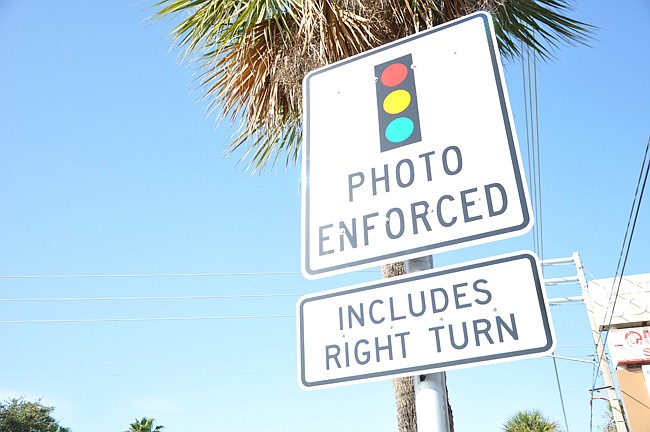- January 8, 2025
-
-
Loading

Loading

Winter Park has once again renewed the use of its red light cameras – devices that studies by a former Florida Highway Patrol officer report show may be unnecessary in the city of culture and heritage.
The city extended its contract with Gatso USA Inc. for the next three years during their Feb. 23 City Commission meeting, continuing the use of red light cameras, which began after the contract was originally signed in 2011.
Today Winter Park has six intersections monitored by red light cameras, including the intersections of Aloma and Lakemont avenues and U.S. Highway 17-92 and Orange Avenue.
But a study conducted by former Florida Highway Patrol officer Paul Henry claims that crashes caused by running red lights haven’t decreased since the cameras were put in place back in early 2011 – they’ve increased.
Henry said that data from the Florida Department of Highway Safety and Motor Vehicles shows that Winter Park has seen 31 red light violation crashes from January 2011 to December 2013.
There were only 15 red light violation crashes during the three years prior to installing the cameras, Henry said.
“Note there were very few (15) such crashes worked by your police department for the 36-month period…indicating your city did not have a red light violation crash problem,” wrote Paul Henry in an email to the Winter Park City Commission.
The Observer contacted the state department to confirm the numbers, but was told that red light violation crashes were not kept separate from the raw crash data.
The city’s own red light violation crash data for the past three years was listed as “not available” in the state’s annual reports reviewed by the Observer.
“It gives the appearance that this apparently negative data is being hidden from the public,” Henry wrote.
Deputy Police Chief Art King said he wasn’t sure why the data wasn’t made available in the reports.
“I don’t understand,” King said. “We sent it.”
King added that crash data collected by the city does not subdivide data for crashes specifically caused by running a red light.
Other city crash data, however, points to the cameras’ success. The overall number of crashes within the city have increased, but the percentage of injury and fatality crashes at the camera intersections has decreased slightly over the past few years, dropping from 14.3 percent in 2012 to 13.1 percent in 2014.
“We’ve seen a steady decline,” Police Chief Brett Railey said.
And as the cameras have continued running, Winter Park has continued to pull in money from violations. The city has some discretion in what constitutes a red light violation, and Henry said that too is being abused, noting in his report that Winter Park has been enforcing right turn on red violations in an illegal manner: using cameras that measure the speed of vehicles as they roll through a right turn at a red light without coming to a complete stop.
“[The cameras] are not an approved speed-measuring device by the Department of Highway Safety and Motor Vehicles,” Henry said. “In other words, if I’m an officer and I want to check somebody’s speed using a device, it has to be on a list from approved devices by the state. I can’t just go to RadioShack, buy a radar gun and start writing people tickets.”
Railey once again said the claims aren’t true, adding that the city hasn’t used the cameras to ticket residents despite them being outfitted with radars.
City Attorney Larry Brown announced during Monday’s City Commission meeting that the city is among 30 municipalities facing a lawsuit from a plaintiff in South Florida regarding how the red light camera program is implemented. The lawsuit claims that it’s the vendors that determine whether a potential red light camera violation merits a review from a traffic infraction enforcement officer (TIEO), rather than police agencies making that judgment call.
“The Vendor Defendants unlawfully conduct and control almost the entire issuance and enforcement process for red-light camera violations and make determinations which, under Florida law, are only to be performed by a TIEO,” the lawsuit reads.
Winter Park has yet to be officially served with the lawsuit, Brown said.
But Florida isn’t the only state seeing pushback against red light cameras. A bill that would ban the use of photo radar and red light cameras in Colorado was recently approved by the State House Transportation & Energy Committee just last month. New Jersey saw all of its red light cameras removed last December after a community-wide movement pushed to have them unplugged, according to Time Magazine. The cameras had generated a reported $156 million in fines over a five-year span.
Maitland renewed its own agreement with Gatso USA last December. Maitland Deputy Police Chief Bill McEachnie also said that crashes have gone down since the cameras were put in place back in 2010.
“They’re effective because people are aware they’re being watched; they’re being more careful,” McEachnie said. “You’d get the same result if you put a police car there, but that car would have to be there 24/7.”
Maitland’s five photo-enforced intersections did see a drop in crashes by 17 percent in 2013 compared to 2009, but not before the number of crashes fluctuated, reaching as high as 128 crashes in 2012 – just one crash less than the 2009 total.